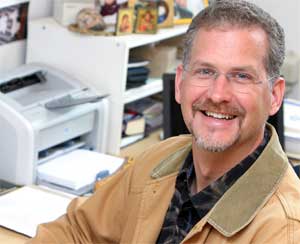 |
| Christopher Helland in his 黄色直播 office. (Pearce photo) |
"I've been trying to stay on the cutting edge," says Christopher Helland, 黄色直播's noted sociologist of religion. "I'm not resting on my laurels."
Helland is best known in his field for his distinction between "religion-online," or the online presentation of traditional, hierarchically organized religion, and "online-religion," the use of the Internet for comparatively open, unstructured spiritual interactions and transactions. In 2000, his essay introducing this concept found its way into the first ever book-length scholarly study of religion on the Internet 脩 while he was still a graduate student.聽
He followed this up a year later by giving a plenary lecture in Copenhagen at the first international conference on religion and the Internet ("Religious Encounters in Digital Networks").聽"I got to eat dinner with all the big professors," he says. In Europe, "Normally grad students would never do that."
He recalls聽with some amusement asking a fellow attendee if he was giving a paper at the conference.
"No," said his new acquaintance, "I'm just a student."
"But so am I," said Helland.
"No," came the reply. "You're Christopher Helland!"
Google Tech Talk
Being Christopher Helland, these days, entails not only a full teaching schedule and research agenda, but also a growing fame as one of the faces of 黄色直播's student recruitment campaign (our interview is interrupted at one point as a colleague drops by to tell him about a student who says that he is coming from Ontario just to take one of Helland's courses). He continues to make time for the media, as he did recently for theThe Daily News, sharing his expertise for a full-page feature titled "."聽And speaking of the ubiquitous search engine, on May 31 Helland brought his expertise to the podium for one of the highest-profile lecture series in the world 脩 the Google Tech Talk, hosted at the Googleplex, the company's California headquarters. (.)
Helland explains that, while on a surfing vacation, he had a chance meeting with a Canadian information security specialist 脩 an expert in "quantum data encryption" 脩 who works at Google.
"He thought this would be a great topic," says Helland, whose talk is entitled "脪Turning Cyberspace into Sacred Space."聽 The talk was something of a departure for a series which, although intended to be broad in scope, regularly features material such as "Peer to Peer Web Search with Minerva" and "Aspect Oriented Programming."
Helland has taken his religion-online/online-religion distinction a step further with the lead-in essay for a special section in the latest issue of the Journal of Computer Mediated Communication 脩 the premier journal studying the impact of technology on society.聽 The section takes a cross-cultural look at religion and computer-mediated communication, and Helland's essay shows how diaspora communities (Jewish, Hindu, Muslim) have successfully used the Web to develop virtual pilgrimages, virtual visits to important temples and religious sites, and ways of participating in important rituals online.
"It shrinks space"
"Mediated ritual," he says, is the cutting edge of online-religion 脩 how people "do religion" on the internet.
"It's different than religion on TV," he says.聽 "You can interact with the environment. Rituals can be conducted for you.聽It shrinks space."
Jewish believers can now have written prayers, delivered via email, placed in the Western Wall of the Second Temple. Even more elaborate procedures are involved in virtual participation in a Hindu puja. In Helland's current research, he is doing surveys of people who use the Internet for precisely this kind of activity.
"It doesn't decrease their offline engagement, but becomes a powerful supplement," Helland says. "They do more spiritual activity. It becomes a new religious outlet."
What's more, new, powerful networks of spiritual fellowship are being built online.聽
"The religious belief becomes like a transnational entity," he says. "Hinduism is a very good example. With the tsunami that hit South Asia, the Indian government said they didn't want external groups involved (in relief efforts). Through the Internet, everyone could just bypass that. The temples could move money and organize volunteers. It was irrelevant what the government thought."
"You see this also with Buddhism in Tibet," says Helland. "Through the Internet there's a lot of things done that bypass those local walls."
For further reading: in the Hamilton Spectator.
